The Future of AI Tools in Space Exploration
As technology continues to advance at a rapid pace, the role of artificial intelligence (AI) in space exploration is becoming increasingly significant. AI tools are revolutionizing the way we explore the cosmos, allowing us to gather more data, make better decisions, and push the boundaries of what is possible in space exploration. In this article, we will discuss the current state of AI tools in space exploration, the potential future developments, and the impact they may have on our understanding of the universe.
Current State of AI Tools in Space Exploration
AI tools are already playing a crucial role in space exploration, helping to streamline operations, improve efficiency, and enhance the capabilities of spacecraft and rovers. One of the most well-known examples of AI in space exploration is the Mars Rover, which uses AI algorithms to navigate the Martian terrain, analyze rocks and soil samples, and make decisions about where to go next.
AI tools are also being used to analyze data from telescopes and other space-based instruments, helping astronomers to discover new planets, stars, and galaxies. By using AI to sift through vast amounts of data more quickly and accurately than humans ever could, scientists are able to make breakthrough discoveries and expand our understanding of the universe.
Future Developments in AI Tools for Space Exploration
The future of AI tools in space exploration is promising, with new developments on the horizon that could revolutionize the way we explore the cosmos. One exciting area of research is the development of autonomous spacecraft that can make decisions on their own, without human intervention. These spacecraft could be equipped with AI systems that allow them to navigate, collect data, and analyze their surroundings in real-time, making them more efficient and capable of exploring new and challenging environments.
Another area of research is the use of AI to assist with the design and construction of spacecraft and space habitats. By using AI algorithms to optimize the design of spacecraft components, engineers can reduce costs, improve performance, and accelerate the development process. AI tools could also be used to simulate the behavior of spacecraft in different environments, helping to identify potential problems before they occur and ensuring the success of future missions.
Impact of AI Tools on Space Exploration
The impact of AI tools on space exploration is already being felt, with advancements in technology leading to new discoveries and expanding our understanding of the universe. As AI continues to evolve and improve, we can expect even greater benefits in the future, including faster data analysis, more accurate decision-making, and the ability to explore new and challenging environments that were previously out of reach.
One of the key benefits of AI in space exploration is its ability to handle vast amounts of data more efficiently than humans ever could. By using AI algorithms to analyze data from telescopes, spacecraft, and other instruments, scientists can make new discoveries and gain insights into the mysteries of the cosmos. AI tools can also help to optimize the performance of spacecraft, making them more reliable and capable of enduring the harsh conditions of space.
FAQs
Q: How are AI tools being used in space exploration today?
A: AI tools are currently being used in a variety of ways in space exploration, including helping to navigate spacecraft and rovers, analyze data from telescopes, and assist with the design and construction of spacecraft components.
Q: What are some potential future developments in AI tools for space exploration?
A: Some potential future developments in AI tools for space exploration include the use of autonomous spacecraft, AI-assisted design and construction of spacecraft components, and simulations of spacecraft behavior in different environments.
Q: What impact do AI tools have on space exploration?
A: AI tools have a significant impact on space exploration, helping scientists to analyze data more efficiently, make better decisions, and explore new and challenging environments that were previously out of reach.
In conclusion, the future of AI tools in space exploration is bright, with new developments on the horizon that could revolutionize the way we explore the cosmos. By harnessing the power of AI, scientists and engineers are able to push the boundaries of what is possible in space exploration, making new discoveries and expanding our understanding of the universe. As AI continues to evolve and improve, we can expect even greater benefits in the future, leading to exciting new discoveries and advancements in our understanding of the cosmos.

